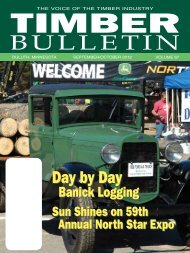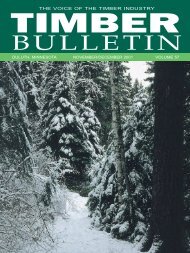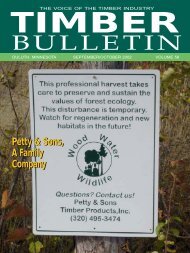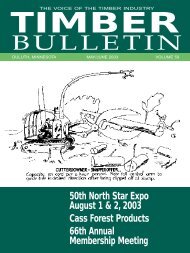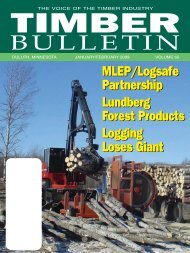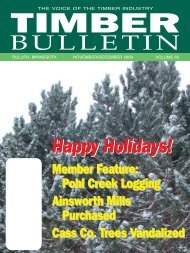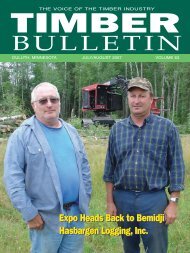Timber Bulletin Nov/Dec - Minnesota Forest Industries
Timber Bulletin Nov/Dec - Minnesota Forest Industries
Timber Bulletin Nov/Dec - Minnesota Forest Industries
Create successful ePaper yourself
Turn your PDF publications into a flip-book with our unique Google optimized e-Paper software.
documents his efforts in reforestation<br />
on his own acres and<br />
lays out a plan to reintroduce the<br />
white pine to the area where it once<br />
grew but has now been replaced by<br />
lesser species. In the forward he<br />
acknowledges the role his own<br />
ancestors played in bringing that<br />
great forest down and indicates<br />
that he feels a special responsibility<br />
for trying to restore what is now<br />
gone.<br />
It’s not just words with Jack<br />
Rajala. The company has planted<br />
thousands of its own acres with<br />
white pine, planting 250,000 trees<br />
in a single year. He says that some<br />
people feel that it should be easy to<br />
restore the white pine to an area<br />
where it once grew in abundance,<br />
but conditions have changed so<br />
much over the past century that it<br />
requires much effort and patience.<br />
He says that if he is to be<br />
remembered for anything he would<br />
wish it to be for his efforts in<br />
restoring these magnificent trees to<br />
northern <strong>Minnesota</strong>.<br />
The “lumber barons” clearcut<br />
their way across the top of the<br />
United States at around the turn of<br />
the century, eliminating much of<br />
the white pine that grew there.<br />
Many of them ended up on the<br />
West Coast where companies<br />
bearing their names still operate. A<br />
classic case is the company started<br />
by Frederick Weyerhaeuser. He<br />
built his last sawmill in <strong>Minnesota</strong><br />
in 1910. It produced a million board<br />
feet of white pine lumber a day.<br />
Those are production statistics you<br />
don’t see anymore – at least not in<br />
white pine.<br />
The company office sits right on<br />
a main highway and there is a<br />
steady stream of logging trucks<br />
moving on this highway. Jack<br />
notices all of these out of the corner<br />
of his eye. He can tell where the<br />
trucks are coming from and he<br />
tends to evaluate each load as it<br />
passes. He knows where the logs<br />
are going by the type of wood and<br />
the appearance of the trucks.<br />
Hopefully, in the future, more of<br />
these trucks will be pulling into<br />
Rajala sawmills with more lumber<br />
trucks pulling out.<br />
The Rajalas have been thru many<br />
of the trials other companies have<br />
yet to face. These trials are not over<br />
yet, but if the past few years are<br />
any indication, the company is well<br />
positioned to weather the storms.<br />
<strong>Minnesota</strong> <strong>Timber</strong> Producers Association<br />
Meet the Director<br />
Lowell Pittack recently retired<br />
from Pittack Logging, Inc., which<br />
he began in 1979. But his<br />
retirement from business hasn’t<br />
meant a retirement from TPA<br />
Board duties at all. Lowell is<br />
extremely dedicated to the TPA,<br />
serving as chair of the<br />
membership committee. He has<br />
also served on the transportation<br />
and insurance committees, and is<br />
a founding member of MLEP.<br />
Lowell says TPA has<br />
contributed to the success of his<br />
business by providing “a forum<br />
for common interests of loggers.<br />
Membership has reduced<br />
insurance and other operating<br />
costs, provided drug testing<br />
services, and educational<br />
opportunities. TPA also gives<br />
loggers the opportunity to<br />
collectively speak with one voice<br />
in the community and in the<br />
legislature.” Plus, Lowell adds,<br />
it’s a way to make lifelong<br />
friends.<br />
Lowell is also involved in the<br />
Itasca Development Corporation,<br />
the Grand Rapids Chamber of<br />
Commerce <strong>Forest</strong>ry Affairs<br />
Committee, the Blandin Paper<br />
Company Environmental<br />
Advisory Board, and the Blandin<br />
Expansion and Retention<br />
Committee.<br />
He is a Community<br />
Presbyterian Church trustee, and<br />
helps with the University of<br />
<strong>Minnesota</strong> North Central<br />
Endowment Fund.<br />
Lowell and his wife, Judy, have<br />
three children, Sandra, Susan and<br />
L. Scott, and six grandchildren.<br />
Lowell enjoys hunting, fishing,<br />
traveling and working in the<br />
wood shop.<br />
<strong>Timber</strong> <strong>Bulletin</strong> <strong>Nov</strong>ember/<strong>Dec</strong>ember 2005<br />
15



